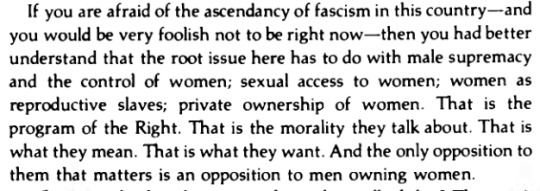remove-the-veil
7K posts
Standing up for women's rights.
Last active 60 minutes ago
Don't wanna be here? Send us removal request.
Text

Escape To the Stars, Pleiades Sisters by Ashley of GhostlyInnovations
1K notes
·
View notes
Text
The liberation of women requires facing the real condition of women in order to change it. “We’re all just people” is a stance that prohibits recognition of the systematic cruelties visited on women because of sex oppression.
-Andrea Dworkin
368 notes
·
View notes
Text
I STILL sometimes see people argue that Trump's victory is the fault of Democrats for not being good enough at messaging, and not making it clear enough to Americans all the good Biden was doing.
I knew. Lots of people I know knew. I don't have a secret line to the white house. I'm around average intelligence. I'm not excessively seeking out news, constantly getting news updates. And yet I knew. And so did many others. The information was there for you to get at any time. It found its way to me without my actively seeking it out. Kamala Harris cannot personally come to your house and slap the tiktok out of your hands. You have to take a crumb of responsibility here.
2K notes
·
View notes
Text





Hundreds of people marched in Minneapolis on Friday to honor missing and murdered Indigenous relatives. Between 27 and 54 American Indian women and girls in Minnesota were missing in any given month from 2012 to 2020, according to the Minnesota Missing and Murdered Indigenous Relatives Office.
Star Tribune, Photos by Leila Navidi.
6K notes
·
View notes
Text
In analyzing the sex-class system, feminists are accused of inventing or perpetuating it. Calling attention to it, we are told, insults women by suggesting that they are victims (stupid enough to allow themselves to be victimized). Feminists are accused of being the agents of degradation by postulating that such degradation exists.
-Andrea Dworkin
115 notes
·
View notes
Text
“Men are taught not to share their feelings isn’t that so sad” I don’t know what dimension you’re from but the men here on earth will immediately let you know they’re upset or angry by taking it out on everyone around them
4K notes
·
View notes
Text



Andrea Dworkin IS NOW IN REPRINT!!! Woman Hating, Pornography, and Right-Wing Women are available to purchase now!
534 notes
·
View notes
Text
The refusal, especially among liberals, to believe that pornography has any real relationship to sexual violence is astonishing. Liberals have always believed in the value and importance of education. But when it comes to pornography, we are asked to believe that nothing pornographic, whether written or visual, has an educative effect on anyone.
-Andrea Dworkin, Letters From a War Zone
419 notes
·
View notes
Text

He’s not “deporting criminals.”
First Felon is importing them.
The brothers forced girls to create explicit content, subjecting them to physical and psychological abuse.
They are welcomed with open arms at Mar-a-Lago.
MAGA is the party of predatory sex traffickers, pedophiles, and rapists. It's rape culture run by fascists.
545 notes
·
View notes
Text
lowkey getting tired of self defeatist blackpill attitudes "the patriarchy will never end" Why not? We went from using boats to rockets in like 200 years but you think men will forever have privilege in society? Why do you think that?
#I think it’s so ugly right now that it’s hard for some to have hope#but I feel strongly this is the death throes#a gigantic global mantrum if you will#I have to believe that#but also not be complacent about the horrors and damage that men throwing their final tantrums can do to women and the world
736 notes
·
View notes
Text

Undesirable men could make themselves more desirable, but turning to the far right is how you tell the world you are unserious and can't stand to self-reflect. A real weak stance.
2K notes
·
View notes
Text
now that there's a gabby petito documentary on netflix i want to throw it back and remember how insane people were when her disappearance was in the news. i remember post after post of nothing but distain for gabby and the investigation because "white girls get so much attention". not advocating for other missing women, not donating to women's causes, not having any sort of conversation about ipv, just pure bitterness and outright aggression towards anyone who cared because caring was racist. international men's day google searches spike on international women's day behaviour
808 notes
·
View notes
Text
It's not progressive to say "women are oppressed so they should be brutalized in films for the sake of realism". Hate to break it to you, but most men are sadistic towards women, not empathetic. The male film director who recycles the violent pornography he’s consumed isn’t challenging anything. He's only desensitizing an entire audience to cruelty against women.
2K notes
·
View notes




